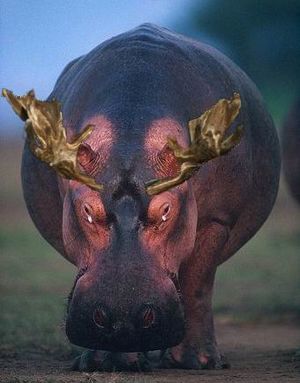UnNews:Hippopotamoose Colony Discovered in Sudan
28 May 2012
KERMA, Sudan -- Scientists have long thought the hippopotamoose — a large, semi-aquatic mammal native to Africa — to be extinct, but a recent discovery has proven them wrong. Hippopotameese (Hippoalces amphibius) once inhabited the area between southern Greece and Madagascar, a larger range than its close cousin, the river hippopotamus, but due to overhunting and low reproduction rates, the animal soon became endangered. Many scientists are puzzled about how this happened.
"Hippoalces... [had] many evolutionary advantages over the other members of the Hippopotamidae family," says Bo Gus, a man who has devoted his life to the study of the creatures. For example, the hippopotamoose is much better adapted to cold temperatures than the river hippo is, and as a result can live further north and at higher altitudes. Also, the hippopotamoose possesses large antlers which are useful in sparring. "If a hippomoose got in a fight with a river hippo, we know who would win."
The last confirmed sighting of a hippopotamoose before recently was in 1872, so it’s no surprise that they were thought to be gone, but just two days ago, some duckologists on a journey to find the rare Nubian Sphinx duck wandered across a pod of hippopotameese. The hippomeese, being very territorial and aggressive, charged at the invading duckologists. The result was gory, with multiple scientists hospitalized, and one dying from her wounds. Those who escaped unscathed described a "moose-hippo thingy. Maybe a hippo with moose antlers." Upon hearing of this, hippopotamoose scholars sprang into action, heading for Africa. Upon arriving in Sudan, at the site of the attack, the scientists were astonished to find a colony of over 700 hippopotameese. "I have no idea how we missed them before!" said Sir Andrew Prized, one of the leading hippomoose scholars, and a professor at University of Cambridge. "What were we thinking?" said Sir Prized, "Sudan obviously has some of the best hippopotamoose habitat in the world."
Over a period of three months, about a hundred scholars plan on staying in Sudan to study the behavior of the hippomoose and possibly come up with a plan to repopulate to its original range, a process that, due to low reproduction rates, could take hundreds of years. "Scientists may never know what endangered the hippopotamoose in the first place," says Gus. "But at least we now have something to hope for in restoring them to their former glory."

